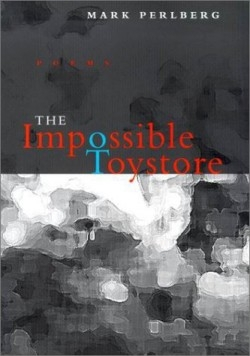The Impossible Toystore
Sometimes what the world offers seems impossible for a person to accept. In the poem, “In the Theatre of Memory,” Perlberg offers the explanation for his book title: “Only months before we entered the impossible / toystore, my father quit the family / by performing the unfathomable trick of dying.” This collection of poems tells many intimate life stories and portrays a meaningful world where each individual must find their own, personal acceptance of it.
The poet acutely observes life from different angles and degrees of intensity. In Part I, the poems are centered around the family life of a young boy. The resulting emotions of anger, fear, and grief are handled straightforward and smoothly, as if these pains are no longer hurtful to the writer, while the poems themselves speak clearly through the bare light of the child’s understanding.
The poem “What Happened in the Woods” in Part II, is an eerie story about a ghostly encounter. Here again, is a story told succinctly, yet there is a loveliness in the selection of words and their placement in the tale. In this section, the dark side of life is expressed, especially in the title poem “Nightsweat” where the narrator is experiencing tumultuous changes in his life including a heart transplant.
The third group of poems, “The Floating World,” is lighter, observing the small moments in life that contain sublime perfection. As Perlberg reflects on a time spent in Japan, he writes for his wife, “These scenes from the beginning of our story / Shine like slides on a white wall.”
Finally, in Part IV, “From the Deep Kitchen,” the poet seems to be more at ease and philosophical about life. There is a simplicity in these poems that describe more childhood memories, but with a sense of comfort regarding the past.
Many of Perlberg’s poems contain studies of people long gone, but are brought forth vividly and with perceptive, alive descriptions. Gardens seem to be a common theme throughout all the sections…almost as a grounding force, despite the curves life may present. There is much personal reflection that is crafted beautifully with the larger, aesthetic world of senses and pure physicality. This book is enjoyable to read as it enhances the awareness of how fleeting life really is and how events are universal in a personal aspect.
Reviewed by
Aimé Merizon
Disclosure: This article is not an endorsement, but a review. The publisher of this book provided free copies of the book to have their book reviewed by a professional reviewer. No fee was paid by the publisher for this review. Foreword Reviews only recommends books that we love. Foreword Magazine, Inc. is disclosing this in accordance with the Federal Trade Commission’s 16 CFR, Part 255.

